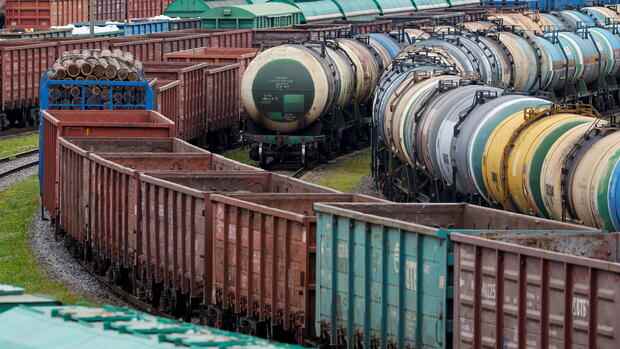The Russian Baltic Sea exclave is located between Lithuania and Poland.
(Photo: Reuters)
In the dispute over the transit of sanctioned goods to the Russian enclave of Kaliningrad, Brussels has still not clearly backed EU member Lithuania. In addition to the obvious annoyance in the Baltic States because of the lack of support, the EU is primarily harming itself with this behavior.
In mid-June, Lithuania declared that sanctioned goods such as steel and metal products would no longer be allowed to Kaliningrad via Lithuanian soil. The government is referring to the fourth EU sanctions package. The extension, based on the same document, followed last Sunday, including the transport of alcohol and cement. Moscow describes the restrictions as “illegal” and invokes the 1994 EU-Russia Partnership Agreement.
In order to defuse the situation, the EU Commission announced weeks ago that it would publish a clarification before the enlargement on this date. But that is still a long time coming. To put it down to disastrous work processes within the Commission would be the friendliest conclusion. Unfortunately, an obvious interpretation of the lack of support for one’s own member states would be that the EU – and especially the German Chancellor Olaf Scholz – was too soft on Moscow.
There is no such thing as a “blockade” of Kaliningrad
First, by not clearly backing Lithuania, the EU risks angering its members in the Baltics and Eastern Europe, who have long warned against making concessions to Russian leader Vladimir Putin. The NATO summit in Madrid recently made it clear again what political and military importance these states will have for security in Europe and the world in the long term. To offend you in the current situation is a serious mistake.
Top jobs of the day
Find the best jobs now and
be notified by email.
Secondly, the EU runs the risk of using the Kremlin narrative of an incipient “blockade” of Kaliningrad by Lithuania in the eyes of the outside world. In fact, there is no blockade: Russia can still deliver the sanctioned goods by sea, food and medicine, like many other goods, are not subject to the blockade anyway.
Kaliningrad’s governor Anton Alikhanov recently even called on tourists to visit the exclave despite the sanctions. “Everything is fine,” he assured.
Third, and this is particularly bitter, the cracks within the EU that are becoming so evident here are playing into Putin’s hands. The Kremlin chief cares a lot about a weak EU and a disunited NATO. The hope that Putin brought the two organizations closer together with the war of aggression against Ukraine falters at the latest when smaller states cannot rely on the EU when in doubt.
More: No vodka for Kaliningrad? Tensions between the EU and Russia are increasing
